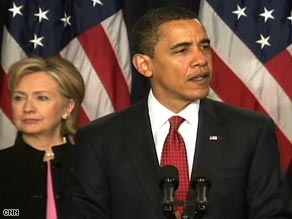 President Barack Obama on Friday will present his new strategy for Afghanistan to NATO allies who are increasingly reluctant to commit more ground troops to the escalating war effort.
President Barack Obama on Friday will present his new strategy for Afghanistan to NATO allies who are increasingly reluctant to commit more ground troops to the escalating war effort.
The military alliance‘s annual summit this year coincides with NATO’s 60th anniversary. While NATO leaders have emphasized that the meeting Friday and Saturday must be more than just a birthday celebration, no major breakthroughs are expected on key issues facing the alliance.
The two-day conference — co-hosted by the Rhine river cities of Strasbourg, France, and Kehl, Germany — is the second of three major international meetings taking place in Europe this week.
Obama and the leaders of the G-20 made headway Thursday on tackling the world’s worst financial crisis since the 1930s. The U.S. president’s meeting with European Union leaders in Prague on Sunday also will focus on economic issues.
NATO’s ability to successfully wage the deadlocked war in Afghanistan is seen as a crucial test of the alliance’s power and relevance. Although European governments have already made clear they are unwilling to deploy significant new ground forces, they have been more enthusiastic about bolstering humanitarian and development assistance to the beleaguered government in Kabul.
In Washington, the chairman of the Joint Chiefs of Staff said Thursday that the United States would ask its allies for more civilian help, including significant assistance to Afghan government ministries.
“That aspect of moving forward together is really critical,” Adm. Mike Mullen told NBC’s “Today.”
Even if he does not win the help he seeks, Obama may use the summit to build up personal ties with leaders whom he is meeting for the first time.
“The NATO summit will be an opportunity to exchange views, and, I hope, find agreement on a common way forward, taking into account the new U.S. effort including more support for Pakistan, a greater effort to strengthen the (Afghan) police, more coordinated aid and visible steps by Kabul to fight corruption,” NATO Secretary-General Jaap de Hoop Scheffer wrote in an editorial in the New York Times.
Mending ties with Russia that have been strained over the alliance’s eastward expansion and last summer’s war between Russia and Georgia as well as welcoming two new members from the Balkans — Albania and Croatia joined NATO this week — are also high on the crowded agenda for NATO’s 28 member nations.
The allies are expected to approve moves to normalize relations with Moscow, which were frozen following the Russo-Georgian war in August. Ties have improved since then, and Russia has allowed NATO nations to use its territory to supply their forces in Afghanistan after the main supply route through Pakistan came under repeated Taliban attacks. But Moscow also wants an end to Bush-era plans to bring Ukraine and Georgia into the alliance, and to install a missile shield in eastern Europe.
The sites of the summit straddling the French-German border were swathed in police and security cordons as demonstrators from several countries poured in with a panoply of demands from pulling out of Afghanistan to building a new and more just world economic order. Up to 65,000 protesters may rally on both sides of the France-German border, authorities said.
The summit leaders will formally welcome France back into NATO’s military wing after a 43-year absence, a largely symbolic move championed by French President Nicolas Sarkozy.
And they are expected to formally launch work on a new “strategic concept” for NATO — essentially an outline of it’s reason for being in the 21st century.
 Eurasia Press & News
Eurasia Press & News


